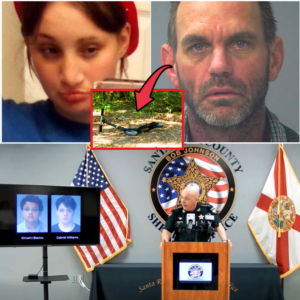In the quiet hamlet of Saint-Molf, nestled amid the salt marshes and medieval charm of Loire-Atlantique, the autumn evening of October 14, 2025, shattered the facade of rural serenity. At around 9:30 p.m., as mist rolled in from the nearby Atlantic, a frail figure stumbled through the gathering dusk. Barely clothed, shivering uncontrollably, the 45-year-old woman pounded on a neighbor’s door, her knocks frantic and feeble. When the door creaked open, she collapsed into the arms of a stranger who hadn’t seen her in years—a ghost from a shared past, now a specter of unimaginable suffering. “Help me,” she gasped, her voice a ragged whisper. “They’ve kept me locked away… for five years.” What unfolded that night would unravel a tale of betrayal, barbarity, and survival that has gripped France, exposing the darkest undercurrents of vulnerability in the heart of its verdant west.
The woman—whose name remains shielded by authorities to protect her fragile psyche—was no stranger to hardship. Divorced in early 2022, she had sought solace in a modest shared flat in the coastal town of Guerande, a place known for its ramparts and fleur de sel rather than its hidden horrors. Her roommate, a 60-year-old nursing assistant at the local hospital, had seemed like a lifeline: compassionate, steady, a woman who tended to the ailing with quiet efficiency. But fragility breeds predators, and this victim, already scarred by psychological wounds from a turbulent life, was an easy mark. Described by prosecutors as “particularly vulnerable,” she battled mental health demons that left her oscillating between lucidity and despair. She trusted too readily, questioned too little—a trait that would seal her fate.
The roommate’s life intersected with an 82-year-old widower at the hospital, a man whose silver hair and gentle demeanor masked a capacity for cruelty. They struck up a romance, and soon he moved into the flat, transforming it into a twisted domesticity. What began as uneasy cohabitation soured quickly. By April 2022, the victim’s world contracted violently. Bank records later revealed a chilling void: no withdrawals for groceries, no traces of rent payments, just abrupt transfers siphoning her modest savings and social security benefits into the couple’s coffers. She “disappeared from the radar,” as one investigator put it, her absence noted only by distant acquaintances who assumed she’d drifted away, as vulnerable souls sometimes do.
The captivity, however, stretched back further, its roots tangled in 2018 and 2019, when subtle manipulations evolved into outright domination. The couple exploited her subjection—psychological and physical—through a web of deceit and dependency. She left the house sporadically in those early days, wandering the salt flats in a haze, only to return, drawn by invisible chains of fear and familiarity. But by spring 2022, mercy ended. They relegated her first to a flimsy tent in the overgrown garden, exposed to the relentless Breton winds and downpours. When that proved insufficient for their control, they herded her into the attached garage—a dank, 20-square-meter tomb of concrete and shadows, its door sealed from the outside with heavy blocks. No key for her, no window to the world. The air inside grew thick with despair, punctuated by the distant hum of village life she could no longer touch.
Life in the garage was a descent into dehumanization, a regimen designed to erode body and spirit. She slept—if one could call it that—on a sagging deckchair, its canvas frayed and unforgiving against her bones. Meals were sporadic humiliations: bowls of porridge, deliberately tainted with dollops of dish soap to induce nausea and submission. “It burned going down,” she later recounted to investigators, her words halting, eyes averted. Bathing, when it occurred, was no act of care but punishment—harsh scrubs with undiluted bleach that blistered her skin and filled her lungs with acrid fumes. She was often stripped bare, her modesty stripped away as casually as her dignity. Defecation became a private shame: a child’s potty or crinkled plastic bags emptied at the couple’s whim, their contents hauled away like refuse.
The elements conspired with her captors. Days blurred into a cycle of exposure: dragged outside for “chores” that were mere excuses to chain her to the garden fence, left to bake under the summer sun or freeze in winter gales. Rain soaked her threadbare coverings; hypothermia became a constant companion, her body a battlefield of chills and fever. They dosed her with medications—pilfered from the nursing assistant’s hospital stock—not for healing, but to dull her resistance, to keep her compliant in a fog of sedation. Over five years, she withered: 50 kilograms melted away, leaving a skeleton wrapped in sallow skin, her once-vibrant frame reduced to 40 kilograms of endurance. Her hair thinned, teeth loosened from malnutrition; scars from bleach etched her like forgotten graffiti.
Financial predation mirrored the physical torment. The couple, living modestly on pensions and her stolen funds, drained her accounts dry—tens of thousands of euros funneled into their pockets for groceries, renovations, even a new television. Social benefits, meant for her survival, were rerouted, her identity forged in fraudulent claims. It was a slow bleed, invisible to the outside world, where neighbors glimpsed the couple’s unremarkable routine: walks along the marshes, chats at the boulangerie. Who suspects the elderly of such savagery? The victim, in her isolation, became a phantom economy, her worth measured in euros and obedience.
Escape, when it came, was a miracle of timing and desperation. On that fateful October evening, the 82-year-old man—her occasional minder—had retreated to the living room, lost in the glow of a football match on the screen. The woman, perhaps lulled by routine, had neglected to double-check the garage’s makeshift seal. Seizing the sliver of freedom, the victim pried at the door, her emaciated arms trembling with effort. She slipped into the night, barefoot over gravel that bit her soles, heart pounding like a war drum. The neighbor’s house, just 50 meters away, loomed as salvation. She hammered the door, then the window, her pleas tumbling out in sobs: tales of the deckchair, the soap-laced gruel, the bleach that scarred her soul.
The neighbor, a middle-aged widow named Marie (a pseudonym for privacy), froze in disbelief. She hadn’t seen the woman since their flat-sharing days a decade prior, assuming she’d relocated after the divorce. “She looked like a wild animal, eyes wide with terror,” Marie would later tell gendarmes, wrapping the intruder in blankets and pressing a glass of water to her cracked lips. Within minutes, sirens wailed; blue lights pierced the hamlet like accusations. Gendarmes from the Saint-Nazaire brigade swarmed the property, their flashlights cutting through the couple’s feigned surprise. The garage door, still ajar, revealed the horror: the deckchair askew, bags of waste in corners, the faint stench of bleach lingering like a confession.
The couple’s arrest came swiftly, at the week’s end, their detention a thunderclap in the sleepy commune. Questioned separately in Nantes’ stark cells, they offered half-truths: admitting the “material conditions” of her confinement but deflecting blame—the man to age and frailty, the woman to “helping a friend in need.” Prosecutors, led by Antoine Leroy, saw through the veneer. Charges cascaded like indictments of the human condition: abduction conjoined with torture or acts of barbarism, a crime carrying the shadow of life imprisonment; fraudulent abuse of psychological or physical subjection from 2019 onward; exploitation of a vulnerable person’s weakness spanning 2018 to the escape date. The 60-year-old woman, her nurse’s scrubs a ironic relic, was remanded in custody, her protests echoing off cell walls. Her partner, hobbled by years, was released under judicial supervision—electronic tagging his leash, court dates his reckoning.
As of October 23, 2025, the victim hovers in limbo, a ward of the state in a secure medical facility near Nantes. Psychiatrists tend her wounds: physical therapy for bleach-damaged skin, counseling for the trauma that replays in nightmares of locked doors. She’s gained a few kilograms, her color returning like tentative dawn, but the scars—visible and invisible—run deep. “She wants justice, not vengeance,” a social worker confides, noting her quiet resolve to testify when ready. Friends from her pre-captivity life, scattered by time, have trickled back: a cousin from Rennes, old colleagues from a part-time job lost to her divorce. They bring photos of happier days—beach outings in La Baule, laughter over crepes—reminders that she was more than a captive.
The case has ignited a firestorm across France, its tendrils reaching from local headlines to national broadcasts. In Guerande’s hospital corridors, whispers question how a caregiver could devolve into a tormentor; colleagues recall the woman’s diligence, now recast as a mask. Broader debates surge: the perils of elder-victim dynamics inverted, the invisibility of domestic prisons in plain sight. Advocacy groups like France Victimes decry systemic blind spots—how social services missed her vanishing act, how bank alerts went unheeded. Loire-Atlantique’s prefecture has pledged reviews: mandatory check-ins for at-risk adults, training for financial institutions to flag anomalies. Politicians in Paris, eyeing midterm elections, invoke it as a call for tougher elder-abuse laws, blending outrage with opportunism.
Yet amid the clamor, the human core endures. Saint-Molf’s residents, once oblivious, now eye garages with unease, their idyll cracked. Volunteers plant flowers outside the sealed house, a quiet vigil for healing. The victim, in stolen moments of clarity, dreams of autonomy: a small flat by the sea, perhaps volunteering at an animal shelter, reclaiming agency one breath at a time. Her ordeal, a five-year eclipse, yields now to fragile light. As investigators sift evidence—ledgers of pilfered funds, medical logs of sedatives—the wheels of justice grind forward. The couple faces trial in the new year, their denials a fragile shield against the weight of truth.
In the salt-kissed air of western France, where tides sculpt the shore relentlessly, one woman’s escape whispers a larger truth: captivity ends not just with keys, but with courage. Five years in shadows forged a survivor, her plea that October night a beacon against the dark. France watches, reckoning with its hidden fractures, as she steps, haltingly, into the sun.

